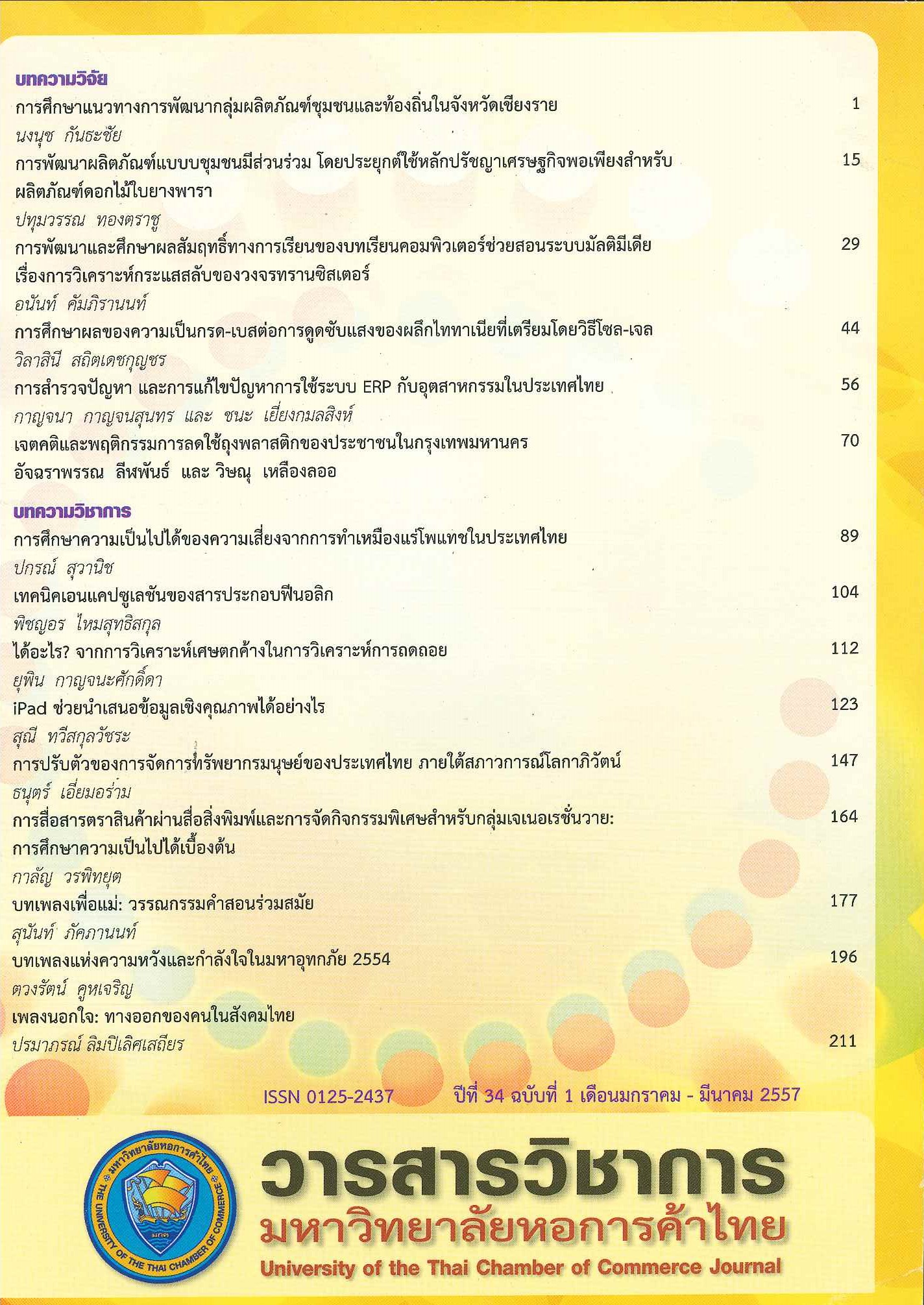The Survey of Problems and Solutions for ERP Implementation in Thai Industry
Main Article Content
Abstract
In today’s global free-trade environment, most industries have to increase their potential in order to increase their competitiveness. It is known that successful implementations of the Enterprise Resource Planning System or ERP System in an organization can enable company personnel resources to improve their efficiency and effectiveness. However, not all organizations have achieved or been successful with ERP implementation. Also, it possibly generates new problems in the organization. The objective of this research is to investigate the problems and causes of unsuccessful ERP implementation in order that the obtained results can be used as guidlines for organizations that are requiring the ERP system. The research was initially conducted by in-depth interviews of the top management of research focused industries comprising 25 companies in order to study the company’s background and their business process. This was followed by management training and workshops about the business process, writing and process improvement with the company project teams. Finally, following a discussion with top management and project teams, the organization can generate the to-be or expected business process. The results of the research shows that companies who have not implemented the ERP system are now encountering the following problems: top management do not understand or recognize the benefits of the ERP system, the company business process is not efficient and unable to integrate with the ERP system. Furthermore, the company does not know how to prepare and adjust to the ERP project. Of those organizations who are currently implementing the ERP system, most are encountering problems of inefficiency and not fully utilized ERP system to its potential such as inaccurate data, unreal time data, unreliable data and inconsistence of requirement data, and so on. The above results can then be use as supporting information for organizations on how to prepare themselves before implementing the ERP system and how to solve their ERP related problems.
Article Details

This work is licensed under a Creative Commons Attribution-NonCommercial-NoDerivatives 4.0 International License.
ลิขสิทธิ์ของบทความ
ผลงานที่ได้รับการตีพิมพ์ถือเป็นลิขสิทธิ์ของมหาวิทยาลัยหอการค้าไทย ห้ามมิให้นำเนื้อหา ทัศนะ หรือข้อคิดเห็นใด ๆ ของผลงานไปทำซ้ำ ดัดแปลง หรือเผยแพร่ ไม่ว่าทั้งหมดหรือบางส่วนโดยไม่ได้รับอนุญาตเป็นลายลักษณ์อักษรจากมหาวิทยาลัยหอการค้าไทยก่อน
References
Kanchanasunthorn, Kanchana. 2012. "A Framwork for Logistics Cost Reduction by Improving Inventory Management Efficiency." University of the Thai Chamber of Commerce Journal 32, 1: 161-178. (in Thai).
กาญจนา กาญจนสุนทร 2555 "กรอบแนวคิดในการบดต้นทุนโลจิสติกส์ด้วยการเพิ่มประสิทธิภาพการจัดการสินค้าคงคลัง" วารสารวิชาการมหาวิทยาลัยหอการค้าไทย 32, 1: 161-178.
Kazuma, Ban, and Ito, Hiroshi. 2003. Enterprise Resource Planning. Translated by Itti Rittaporn, et. al. Bangkok: Technology Promotion Association (Thailand-Japan). ( in Thai).
คาซึมะ, บัน และอิโต, ฮิโรชิ. 2546. สู่การเป็นผู้นำในการใช้ ERP แปลโดย อิทธิ ฤทธาภรณ์ และคณะ กรุงเทพมหานคร: สมาคมส่งเสริมเทคโนโลยี (ไทย-ญี่ปุ่น)
Law, C., and Ngai, E. 2007. "ERP Systems Adoption: An Exploratory Study of the Organizational Factors and Impacts of ERP Success." Information & Management 44. 4: 418-432.
Motwania, J.,et. al. 2002. "Successful Implementation of ERP Projects: Evidence from Two CaseStudies." International Journal of Production Economics 75: 83-96.
Motwania, J., Subramanian, R., and Gopalakrishna, P. 2005. "Critical Factors for Successful ERP Implementation: Exploratory Findings from Four Case Studies." Computers in Industry 56, 6: 529-544.
Umble, E.J., Haft, R.R., and Umble, M.M. 2003. "Enterprise Resource Planning: Implementation Procedures and Critical Success Factors." European Journal of Operation Research 146, 2: 241-257.


